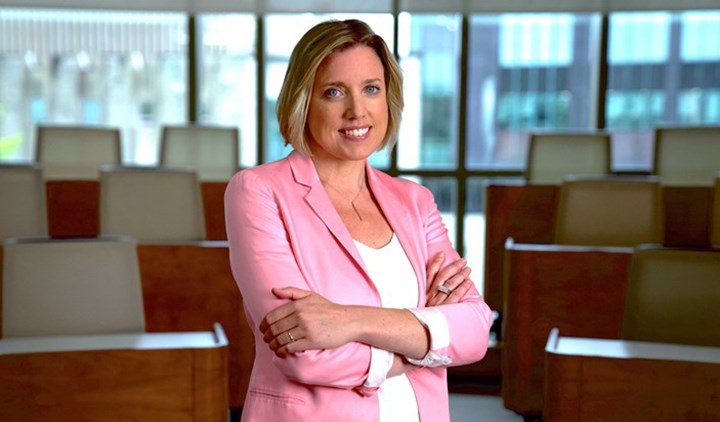From lost to found
Janice Byrne explores how women violence survivors find themselves through entrepreneurship
October 15, 2023

Janice Byrne collaborated with Amanda Shantz (University of St. Gallen) and Amanda Bullough (University of Delaware) to research how entrepreneurship education can provide a space for finding your true self, specifically looking at women survivors of sexual or domestic violence. Their paper, “What About Us? Fostering Authenticity in Entrepreneurship Education,” published in Academy of Management Learning & Education (AMLE), is based on research conducted in Paris, France from 2014-2019.
In the Q&A below, Byrne discusses what prompted the research, the key findings, and the potential impact on entrepreneurship training and support.
How did you get started in this area of research?
In my previous business school, I was academic director for an entrepreneurship program specifically designed for women survivors of violence. As I collected data to assess the program’s impact, I was struck by the radical disconnect between the women’s accounts of their transformation and the typical learning outcomes documented in research on entrepreneurship education. While the women often passionately voiced how the program had changed them, the existing studies focused more on the number or profitability of venture start-ups, rather than the women’s personal transformation.
The program gave me the perfect research context, enabling me to combine the two topics in entrepreneurship that I am passionate about: gender equality and entrepreneurship training and support.
What problem are you trying to solve?
As humans, we all have an innate desire to be authentic and true to our “real selves.” Entrepreneurship can be a useful space for people to engage in authenticity work, but up until now, there has been little research that examines how aspiring entrepreneurs bring their understanding of who they are into closer alignment with what they do (i.e. their venture).
We sought to understand if and how an entrepreneurship program could facilitate the pursuit of authenticity, as well as what that authenticity looked like in the form of entrepreneurial endeavors.
This research involved an in-depth exploration of an entrepreneurship program designed for a specific population: women survivors of sexual or domestic violence. Violence strikes at the heart of who one truly is – that is why this sample is particularly apt to study authenticity dynamics – these women had had their sense of self completely rocked, destabilizing their personal identity.
What did you find?
Prior to the program, trauma had destabilized the women’s identities, and they had lost their sense of self. Our analysis revealed how the women transitioned from feeling “lost” to finding themselves and seeing their own image in the ventures they created (i.e. realizing authenticity). We identified three specific types of authentic endeavors that the women engaged in. For example, some women created ventures that resonated with their lived experiences (i.e. holistic care for abused women). Others built companies reflecting their true self image (i.e. re-connecting with a childhood passion or cultural heritage). A third group cognitively reconstructed their existing venture to more closely align with who they are, effectively rewriting the meaning of their business i.e. massage as ‘healing’.
We also document the program components, and three associated mechanisms, that facilitated the women on their journey from lost (disrupted identity) to found (authenticity). Personal development workshops, business skills training, networking, and events led the women to (a) understand and accept themselves, (b) believe in their own agency, and (c) experience a newfound vitality for their ventures and lives. These three mechanisms were amplified by the high-quality connections the women forged with their peers, their mentors, and other actors associated with the program.
What has been the impact?
Our study takes a deep dive into the outcomes – other than economic - that entrepreneurship can provide. Our research shows how entrepreneurship programming can offer a unique opportunity to connect with one’s true self.
I like to think that we are at the cusp of change in entrepreneurship training and support. Instead of focusing on outcomes such as the number of venture start-ups, employability rates, investment and revenues, we’re gaining a broader appreciation of the personal transformation and societal benefits entrepreneurship can bring. I firmly believe that we need a shift in “mainstream” thinking on entrepreneurship program design. If we broaden its scope from a narrow focus on venture-related goals to one that encapsulates personal and societal transformation, we could yield powerful benefits for individuals, schools, and societies alike.
Since the publication of this article (and its sister article) in AMLE, my colleagues and I have been inundated with communications from practitioners and academics from all around the world, many seeking to create and develop similar programs. Working and collaborating with others to further instructional design in this domain is considerably more impactful than an academic publication.
What’s next for you?
The time is ripe for us to critically reflect on accelerators and incubators, evaluating what they do and how they do it. I believe that a lot can be learned from studying different kinds of accelerators and specific audiences.
There are darker aspects to entrepreneurial support organizations – such as accelerators – that I would like to further explore. For example, what of the potentially harmful impact that misguided – albeit well-intentioned – instructors, volunteers and facilitators can have on aspiring entrepreneurs? This can be accentuated in the case of programs designed for, or including, marginalized folks.
Practically speaking, if we truly seek to ensure an inclusive approach to entrepreneurship, we need to look at ways in which entrepreneurial support organizations can be exclusionary. We also need to recognize how much mainstream (entrepreneurship) educators can learn from those at the margins.